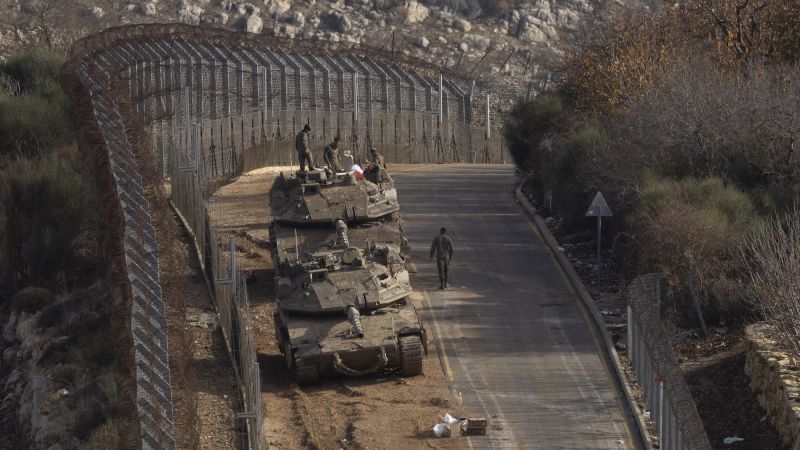
It’s morning in Damascus. Here’s what you need to know The Assad regime’s outgoing prime minister agreed to hand over power to Syria’s rebels Monday, a day after insurgents seized the capital and toppled longtime dictator Bashar al-Assad. News of Assad’s ouster sparked jubilation on the streets of Damascus and in Syrian communities around the world, as rebels and civilians ransacked the former dictator’s palaces.
Thousands of political prisoners were released from Assad’s notorious jails. But the future of the war-ravaged country remains uncertain, with Islamist militants Hayat Tahrir al-Sham (HTS) — designated a foreign terrorist organization by the United States — leading the rebel groups who are set to take control. Here are the latest developments.

Power transfer: HTS leader Abu Mohammad al-Jolani met with outgoing prime minister Mohammad Ghazi al-Jalali in Damascus Monday to “coordinate the transfer of power in a manner that ensures the provision of services to our people in Syria.” A transitional prime minister has yet to be picked, a source told CNN, but al-Jalali has pledged to cooperate. Israeli strikes: Israel said its military struck Syria’s chemical weapons capabilities as it ordered its army to establish a “security zone” inside Syrian territory , separating the Israeli-occupied Golan Heights from the rest of Syria.
The United Nations said the move was in breach of a 1974 agreement. Prisoner search: Syrians rushed to Saydnaya prison, known as “the slaughterhouse,” to search for their loved ones following rumors that an underground area of the notorious regime jail was filled with thousands of prisoners. But the Syrian Civil Defense said it found “no evidence of undiscovered secret cells.
” Regime reckoning: A list of senior Assad regime officials wanted for torture will soon be announced, Syria’s rebels said. For half a century, the Assad family ruled over the country with an iron fist, with long-documented reports of mass incarceration, torture, extra-judicial killings and atrocities against their own people. Conscript amnesty: Syria’s rebels called on the Assad regime’s security forces to register with what they are calling “a settlement center.
” The rebels have promised amnesty for all conscripted soldiers, but those rules do not apply to those who volunteered to fight. US interests: The United States has “clear and enduring interests in Syria,” such as fighting ISIS, preventing weapons of mass destruction from falling “into the wrong hands” and avoiding “the export of terrorism and extremism” from the country, Secretary of State Antony Blinken said. Meanwhile, the US charged two former high-ranking Syrian intelligence officials with war crimes for allegedly torturing Americans and other civilians.
Missing American: The top US hostage envoy is in Beirut as part of “intensive efforts” to find freelance journalist Austin Tice , the State Department said. US officials have reached out to Syrian opposition forces about Tice, who was detained in Damascus in 2012, hoping to learn more about his whereabouts. US charges former Syrian officials for allegedly torturing Americans Two former high-ranking Syrian intelligence officials have been charged with war crimes for allegedly torturing Americans and other civilians who were deemed enemies by the Syrian government and held in a military prison, the Department of Justice said Monday.
US prosecutors say the two officials in former President Bashar al-Assad’s regime oversaw operations of the detention facilities at the Mezzeh Military Airport near Damascus, where detainees were beaten, electrocuted, hung by their wrists, burned with acid and had their toenails removed. The alleged crimes occurred during the civil war that wracked the country for over a decade and culminated in the extraordinary fall of the Assad regime over the weekend. Former Syrian air force intelligence officers Jamil Hassan, 72, and Abdul Salam Mahmoud, 65, “created an atmosphere of terror at Mezzeh Prison,” prosecutors said.
They were charged with conspiracy to commit war crimes through cruel and inhuman treatment, according to an unsealed indictment filed in federal court in Chicago. Warrants for their arrests have been issued, and they remain at large, the Justice Department said. Read more about the charges.
After Assad's fall, what comes next for Syria? Many in Syria are celebrating a stunning and unexpected political turn that caught much of the world off guard. Abu Mohammad al-Jolani , leader of Islamist rebel group Hayat Tahrir al-Sham (HTS), declared victory for the “entire Islamic nation” on Sunday, in his first public remarks since the coup, which he said “marks a new chapter in the history of the region.” “My heart longed for this moment,” added Jolani.
“There is not a single household in Syria that the war has not touched.” But the change in power is shrouded by uncertainty, too. It’s unclear what a new governing system in Syria would look like, how it will work given the disparate groups and interests involved, and whether the reordering of power will only lead to further instability.
US Defense Secretary Lloyd Austin cautioned on Monday that ISIS could attempt to “take advantage” of a power vacuum in the country. Jolani has gone to great lengths to reassure Christian and Kurdish Syrians as his offensive spread across the country, but HTS has a history of harsh treatment against political enemies, and it is an open question whether his outreach will continue once the eyes of the world have moved elsewhere. A video shared by the rebels Monday shows Jolani meeting with the regime’s outgoing prime minister, Mohammad Ghazi al-Jalali, to discuss the transfer of power.
Mohammed al-Bashir, the HTS-linked prime minister of the Salvation Government, which administers the rebel-held Idlib area of northern Syria, was also at the meeting. The meeting in Damascus came after the outgoing prime minister pledged to cooperate with the rebels and endorse “a smooth and systematic transition of government functions” and preserve “state facilities,” in a message recorded after the rebels took Damascus. Read more about the transition of power in Syria.
No evidence of secret cells found in notorious Saydnaya prison, White Helmets say The search for possible prisoners in secret cells in Syria’s notorious Saydnaya prison has ended, according to the Syrian Civil Defense, also known as the White Helmets, who added there was “no evidence of undiscovered secret cells or basements.” “The search did not uncover any unopened or hidden areas within the facility,” the group said in a statement Monday. The group had deployed specialized teams to look for secret cells or hidden basements that might be holding additional prisoners as speculation mounted about more detainees being held in deeper levels of the prison, dubbed the “human slaughterhouse” by Amnesty International.
“Specialized teams from The White Helmets conducted a thorough search of all sections, facilities, basements, courtyards, and surrounding areas of the prison. These operations were carried out with the assistance of individuals familiar with the prison and its layout. However, no evidence of undiscovered secret cells or basements was found,” the White Helmets said.
The volunteer group said it shared the “profound disappointment” of the families of those who remain missing and urged people on social media to avoid the spread of the “widespread misinformation and rumors circulating about prisons and detainees.” As rebel forces released prisoners from Saydnaya over the weekend, Syrians took to social media for news of missing or detained loved ones — some families even gathering outside the prison in hope. Israel's presence in the Syrian buffer zone violates 1974 agreement, UN says The United Nations Disengagement Observer Force (UNDOF) told Israel that its presence in the Syrian buffer zone would violate the 1974 Agreement on Disengagement with Syria, the UN Secretary General’s spokesperson Stéphane Dujarric said Monday.
Israeli Prime Minister Benjamin Netanyahu on Sunday said that he had ordered the military to “take control” of the buffer zone, which separates the Israeli-occupied Golan Heights from the rest of Syria. The UN has confirmed that Israeli troops entered the buffer zone and were moving within that area, where they remain in at least three locations, according to Dujarric. “There should be no military forces or activities in the area of separation,” he said.
Dujarric also said UNDOF personnel, who are tasked with maintaining a ceasefire between Israel and Syria and supervising the areas of separation and limitation, remain at their positions and are carrying out their mandated activities. “Currently, the situation in the UNDOF area of operations is relatively calm,” he said. Analysis: Assad’s fall is huge blow for Putin, highlighting fragility of his own rule The world now knows the colors of Syrian dictator Bashar al-Assad’s parachute: the Russian tricolor.
Assad’s flight to Moscow following the swift collapse of his regime means more than just the loss of a client state for the Kremlin. The fall of the House of Assad deals a major blow to Russian President Vladimir Putin’s aspirations as a Middle East power broker – and raises new questions about the fragility of his own regime. Putin’s opponents are already cheering.
“Minus one dictator and ally of Putin,” wrote prominent Russian opposition activist Ilya Yashin on X, posting a photo of an Assad banner in flames. “Putin has thrown Assad under the bus to prolong his war in Ukraine,” commented former Ukrainian Foreign Minister Dmytro Kuleba . “His resources are scarce, and he is not as strong as he pretends.
” For observers of Russia’s war on Ukraine , Assad’s departure raises some striking historical parallels. Assad now joins a onetime Ukrainian counterpart in exile: Former Ukrainian President Viktor Yanukovych fled Ukraine for Russia in 2014 after weeks of street protests that culminated in a bloody crackdown. Syrians are now roaming through Assad’s abandoned presidential palace in Damascus, much as Ukrainians were able to visit the grounds of Mezhyhirya, the garish estate once occupied by Yanukovych.
Read the full analysis. Syrian rebels urge Assad regime security forces to register with them Syrian rebels are calling on the Assad regime’s security forces to register with what they are calling “a settlement center.” Military Operations Command, the rebel coalition consisting of Hayat Tahrir al-Sham (HTS), announced the opening of a “settlement center for members of the criminal regime in Homs.
” “All Assad regime forces need to visit the center to complete settlement procedures and receive a temporary ID before Saturday Dec 14, 2024,” the rebels’ statement read. Former regime members are required to bring all documents, regime-issued equipment and official belongings or they will be subject to prosecution if they provide false or incomplete information. Earlier on Monday, the rebels issued a general amnesty for conscripted soldiers in the Syrian military, saying, “they are granted safety for their lives, and any harm against them is strictly prohibited.
” Amnesty does not apply to officers and soldiers who volunteered to serve. The armed rebel alliance charged across Syria over 11 days, sweeping through major cities in a lightning-fast offensive before taking control of the capital, Damascus, over the weekend..















